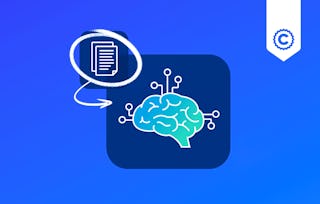Vous disposez de données et vous vous demandez ce qu'elles peuvent vous apprendre ? Vous avez besoin de mieux comprendre comment l'apprentissage automatique peut améliorer votre activité ? Voulez-vous être en mesure de converser avec des spécialistes sur des sujets allant de la régression et de la classification à l'apprentissage profond et aux systèmes de recommandation ? Dans ce cours, vous obtiendrez une expérience pratique de l'apprentissage automatique à partir d'une série d'études de cas pratiques. À la fin du premier cours, vous aurez appris à prédire le prix des maisons en fonction de caractéristiques propres à chaque maison, à analyser le sentiment des utilisateurs, à extraire des documents intéressants, à recommander des produits et à rechercher des images. Grâce à la pratique de ces cas d'utilisation, vous serez en mesure d'appliquer les méthodes d'apprentissage automatique dans un large éventail de domaines. Ce premier cours traite la méthode d'apprentissage automatique comme une boîte noire. En utilisant cette abstraction, vous vous concentrerez sur la compréhension des tâches d'intérêt, l'adaptation de ces tâches aux outils d'apprentissage automatique et l'évaluation de la qualité des résultats. Dans les cours suivants, vous approfondirez les composants de cette boîte noire en examinant les modèles et les algorithmes. Ensemble, ces éléments forment le pipeline d'apprentissage automatique, que vous utiliserez pour développer des applications intelligentes. Objectifs pédagogiques : À la fin de ce cours, vous serez en mesure : -d'identifier les applications potentielles de l'apprentissage automatique dans la pratique.

Fondements de l'apprentissage automatique : Une approche par étude de cas

Fondements de l'apprentissage automatique : Une approche par étude de cas
Ce cours fait partie de Spécialisation Apprentissage automatique


Instructeurs : Emily Fox
409 747 déjà inscrits
Inclus avec
13,550 reviews
Compétences que vous acquerrez
- Catégorie : Développement d'applications
- Catégorie : Algorithmes de classification
- Catégorie : Apprentissage automatique
- Catégorie : Exploration de texte
- Catégorie : Programmation en Python
- Catégorie : Deep learning
- Catégorie : Intelligence artificielle
- Catégorie : Modélisation prédictive
- Catégorie : Traitement du langage naturel (NLP)
- Catégorie : Apprentissage non supervisé
- Catégorie : Analyse de régression
- Catégorie : Ingénierie des caractéristiques
- Catégorie : Prétraitement de données
- Catégorie : Analyse d'images
- Catégorie : Évaluation de modèles
- Catégorie : Apprentissage automatique appliqué
- Catégorie : Apprentissage supervisé
- Catégorie : Vision par ordinateur
Détails à connaître

Ajouter à votre profil LinkedIn
11 devoirs
Découvrez comment les employés des entreprises prestigieuses maîtrisent des compétences recherchées

Élaborez votre expertise du sujet
- Apprenez de nouveaux concepts auprès d'experts du secteur
- Acquérez une compréhension de base d'un sujet ou d'un outil
- Développez des compétences professionnelles avec des projets pratiques
- Obtenez un certificat professionnel partageable

Il y a 7 modules dans ce cours
L'apprentissage automatique est omniprésent, mais il opère souvent dans l'ombre. </p> <p>Cette introduction à la spécialisation vous donne un aperçu de la puissance de l'apprentissage automatique et de la multitude d'applications intelligentes que vous serez personnellement en mesure de développer et de déployer à l'issue de la formation.</p> <p>Nous discutons également de qui nous sommes, de comment nous en sommes arrivés là et de notre vision de l'avenir des applications intelligentes.
Inclus
18 vidéos9 lectures1 devoir
Cette semaine, vous allez construire votre première application intelligente qui fait des prédictions à partir de données.</p> <p>Nous allons explorer cette idée dans le contexte de notre première étude de cas, la prédiction des prix de l'immobilier, où vous allez créer des modèles qui prédisent une valeur continue (le prix) à partir de caractéristiques d'entrée (superficie, nombre de chambres et de salles de bains,...). <D'autres applications vont de la prédiction des résultats de santé en médecine, du cours des actions en finance, de l'utilisation de la puissance dans le calcul à haute performance, à l'analyse des régulateurs qui sont importants pour l'expression des gènes.</p>Vous examinerez également comment analyser la performance de votre modèle prédictif et mettre en œuvre la régression en pratique à l'aide d'un carnet de notes Jupyter.
Inclus
19 vidéos3 lectures2 devoirs
Dans notre deuxième étude de cas, l'analyse des sentiments, vous créerez des modèles qui prédisent une classe (sentiment positif/négatif) à partir de caractéristiques d'entrée (texte des commentaires, informations sur le profil de l'utilisateur,...).Cette tâche est un exemple de classification, l'un des domaines les plus utilisés de l'apprentissage automatique, avec un large éventail d'applications, y compris le ciblage publicitaire, la détection de spam, le diagnostic médical et la classification d'images.</p>Vous analyserez la précision de votre classificateur, mettrez en œuvre un classificateur réel dans un carnet Jupyter, et prendrez un premier coup sur une pièce maîtresse de l'application intelligente que vous allez construire et déployer dans votre capstone.
Inclus
19 vidéos3 lectures2 devoirs
Un lecteur s'intéresse à un article spécifique et vous souhaitez trouver des articles similaires à lui recommander. Quelle est la bonne notion de similarité ? Comment effectuer une recherche automatique parmi les documents pour trouver celui qui est le plus similaire ? Dans cette troisième étude de cas, qui porte sur la récupération de documents, vous examinerez diverses représentations de documents et un algorithme permettant de récupérer le sous-ensemble le plus similaire. Vous examinerez également des représentations structurées des documents qui regroupent automatiquement les articles par similarité (par exemple, le sujet du document).</p>Vous construirez un système intelligent de recherche de documents pour les entrées de Wikipédia dans un carnet Jupyter.
Inclus
17 vidéos3 lectures2 devoirs
Vous êtes-vous déjà demandé comment Amazon formule ses recommandations de produits personnalisées ? Comment Netflix suggère des films à regarder ? Comment Pandora sélectionne la prochaine chanson à diffuser ? Comment Facebook ou LinkedIn trouve des personnes avec lesquelles vous pourriez être en contact ? Toutes ces technologies de personnalisation du contenu reposent sur ce que l'on appelle le filtrage collaboratif. vous apprendrez à construire un tel système de recommandation à l'aide d'une variété de techniques, et explorerez leurs compromis.</p> <p>L'une des méthodes examinées est la factorisation matricielle, qui apprend les caractéristiques des utilisateurs et des produits pour former des recommandations. Dans un carnet Jupyter, vous utiliserez ces techniques pour construire un véritable système de recommandation de chansons.
Inclus
19 vidéos3 lectures2 devoirs
Vous avez probablement entendu dire que l'apprentissage profond (Deep Learning) est l'une des techniques les plus prometteuses dans le domaine de l'apprentissage automatique et qu'elle fait parler d'elle dans le monde entier. Dans notre dernière étude de cas, la recherche d'images, vous apprendrez comment les couches de réseaux neuronaux fournissent des caractéristiques très descriptives (non linéaires) qui offrent des performances impressionnantes dans les tâches de classification et de recherche d'images. Vous construirez ensuite des caractéristiques profondes, une technique d'apprentissage par transfert qui vous permet d'utiliser l'apprentissage profond très facilement, même lorsque vous avez peu de données pour entraîner le modèle.</p> <p>En utilisant les carnets iPhython, vous construirez un classificateur d'images et un système intelligent de recherche d'images avec l'apprentissage profond.
Inclus
18 vidéos4 lectures2 devoirs
Dans la conclusion du cours, nous décrirons l'étape finale de la transformation de nos outils d'apprentissage automatique en un service : le déploiement.</p> <p>Nous discuterons également de certains défis ouverts auxquels le domaine de l'apprentissage automatique est encore confronté, et de ce que nous pensons être l'avenir de l'apprentissage automatique. Nous concluons avec un aperçu de ce qui vous attend dans le reste de la spécialisation, et les applications intelligentes étonnantes qui nous attendent à mesure que nous faisons évoluer l'apprentissage automatique.
Inclus
7 vidéos1 lecture
Obtenez un certificat professionnel
Ajoutez ce titre à votre profil LinkedIn, à votre curriculum vitae ou à votre CV. Partagez-le sur les médias sociaux et dans votre évaluation des performances.
Instructeurs


Offert par
En savoir plus sur Apprentissage automatique
 Statut : Essai gratuit
Statut : Essai gratuit Statut : Prévisualisation
Statut : PrévisualisationO.P. Jindal Global University
 Statut : Essai gratuit
Statut : Essai gratuitFractal Analytics
 Statut : Essai gratuit
Statut : Essai gratuitCoursera
Pour quelles raisons les étudiants sur Coursera nous choisissent-ils pour leur carrière ?

Felipe M.

Jennifer J.

Larry W.

Chaitanya A.
Avis des étudiants
- 5 stars
72,38 %
- 4 stars
20,75 %
- 3 stars
3,73 %
- 2 stars
1,13 %
- 1 star
1,98 %
Affichage de 3 sur 13550
Révisé le 20 juil. 2019
A great course, really designed to understand the underlying core concepts of machine learning using real-life examples which takes you through all that with little to no programming skills required!
Révisé le 18 mai 2020
The course was very informative but I face a lot of problems in installing Graphlab and Turicreate. I request the Mentors please use the Pandas data frame in place of SFrame. The mentors are cool.
Révisé le 27 mars 2022
very nice course.If you have basic knowledge of python datastructure then this course is best to start data science.All contents are beginner friendly which makes this course easily understandable.

Ouvrez de nouvelles portes avec Coursera Plus
Accès illimité à 10,000+ cours de niveau international, projets pratiques et programmes de certification prêts à l'emploi - tous inclus dans votre abonnement.
Faites progresser votre carrière avec un diplôme en ligne
Obtenez un diplôme auprès d’universités de renommée mondiale - 100 % en ligne
Rejoignez plus de 3 400 entreprises mondiales qui ont choisi Coursera pour les affaires
Améliorez les compétences de vos employés pour exceller dans l’économie numérique
Foire Aux Questions
Pour accéder aux supports de cours, aux devoirs et pour obtenir un certificat, vous devez acheter l'expérience de certificat lorsque vous vous inscrivez à un cours. Vous pouvez essayer un essai gratuit ou demander une aide financière. Le cours peut proposer l'option "Cours complet, pas de certificat". Cette option vous permet de consulter tous les supports de cours, de soumettre les évaluations requises et d'obtenir une note finale. Cela signifie également que vous ne pourrez pas acheter un certificat d'expérience.
Lorsque vous vous inscrivez au cours, vous avez accès à tous les cours de la spécialisation et vous obtenez un certificat lorsque vous terminez le travail. Votre certificat électronique sera ajouté à votre page Réalisations - de là, vous pouvez imprimer votre certificat ou l'ajouter à votre profil LinkedIn.
Oui, pour certains programmes de formation, vous pouvez demander une aide financière ou une bourse si vous n'avez pas les moyens de payer les frais d'inscription. Si une aide financière ou une bourse est disponible pour votre programme de formation, vous trouverez un lien de demande sur la page de description.
Plus de questions
Aide financière disponible,

